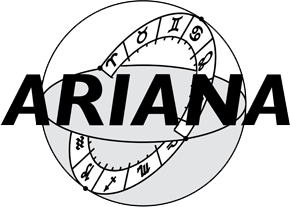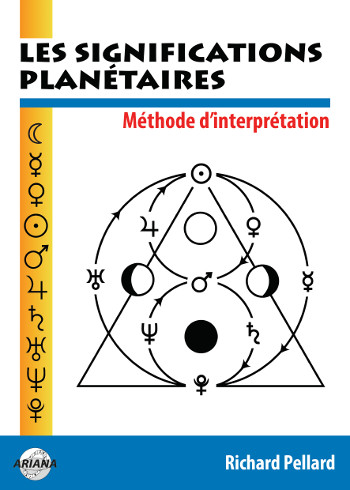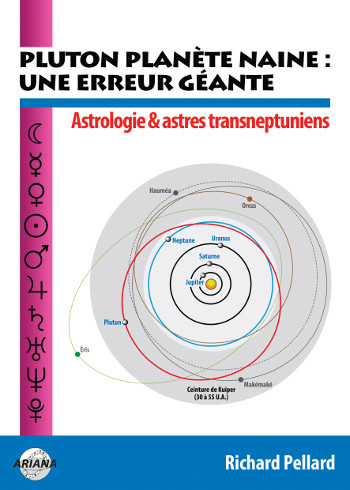Your Planets
Portraits of the Planets
Aspects between Planets
The planetary ages
The planetary families
Planets in Signs
The Planets in comics


The interpretation examples that we are suggesting are very far from being exhaustive: they only show and outline a general frame describing the issues of the planetary function. They should therefore not be taken literally. Each being brings indeed its own responses, more or less original, to the questions raised by a planetary function. There is no magic formula. Through using the R.E.T. and of the Theory of Ages and combining logic, observation and imagination, you will be able to develop a thousand other possible meanings, a thousand other variations on the same theme.
Generally: switching from the multiple to the duo-duel. The invisible as it manifests, feels and experiences. The oddities of physics. The unknown conditionings which are transformed into experimental behaviors. The uncertain or the improbable which are embodied, are transformed into facts. Events rich in underlying and indefinable content. The emotional effectiveness of hidden, imaginary or real realities. The reduction of integral complexity to chiaroscuro, paradoxical and ambiguous half-truths. Acts dictated by the unconscious. The feeling, sensation or perception of a mystery, of an elsewhere.
Psychologically: Act intuitively, on the strength of presciences or presentiments. Being clairvoyant without really being aware. To feel inhabited by something that completely goes beyond the individual. Share your sense of mystery and experience your unconscious. Make possible the uncertain, probable the incredible. Feeling invaded by strange or unusual sensations, having bizarre behaviors that defy known norms. To be subtle, sibylline, unpredictable in the way you act. Let yourself be guided, in your experience, by generous and dense moods, deep and imprecise aspirations. Have an irrational faith pegged to the body.
The positive characteristics of the neptunian function are the prospective imagination (trio Extensive Transcendence with Uranus and Pluto) and the intense sensoriality (trio intensive existence with Venus and Mars).
The Neptunian is an intuitive haunted by the powers of the imagination, connected to subtle, underlying, invisible realities. It is determined according to deep aspirations, under the insidious pressure of the most buried layers of its being. He feels inhabited by an elsewhere which surpasses him on all sides and which decides everything for him. He allows himself to be guided by his inspiration, by his presciences, his presentiments. He miraculously knows how to make the right choices, without wanting to, as if what he was doing was the fruit of an obscure but powerful necessity. His inner life is rich, dense, complex, traversed by states of mind, dreams and visions. He doesn’t know what motivates him deep down and that doesn’t matter to him: he has faith in his future, in his radar and only listens to his little finger. His subtle and nuanced mind is not afraid of paradoxes, ambivalences, ambiguities: he knows intimately that they are a reflection of life, which is always unpredictable and disconcerting in its manifestations.
The Neptunian is a delicate sensory, almost mediumistic, a sensitive plate that strongly feels the most tenuous signals. The tiniest variations in the external atmosphere touch him, make him react, move him. He feels the invisible, sniffs the mystery, listens to the secret music of silence. He perceives what others do not and embodies in his vibrant and quivering way a strange and surprising logic that drives him to react, often with surprising accuracy, according to the moods dictated by his unconscious, the moods that cross it. His presence is disconcerting: he is both here through the turbulence that agitates him and elsewhere, in his impenetrable and incomprehensible world for common logic. His inner barometer decides what he is going to do. The weather of his soul is changeable and mysterious, it quickly changes from calm to stormy. He does not know until the very last moment which course he will follow instinctively, without tension but with incredible determination.
In negative, the Neptunian lives so deeply in his own world, haunted by his dreams, his visions and his confused aspirations, that nothing outside really makes sense to him or seems able to speak to him and arouse his curiosity, his interest, his desire. He inhabits an inexpressible universe that no pleasant, relaxed, smiling communication can translate or satisfy: hence a certain form of ambiguous isolation, which is manifested in him by a half-absent presence making contact extremely difficult, introducing a sly malaise and impalpable tensions in human relations. He is closed to others without seeming to be, does not know how to make himself attractive.
In positive, the Neptunian experiences sensations so rich and so deep, so essential too, that he doesn’t really care to play the pretty hearts, the amusing or the interesting to impress the gallery. He knows that everyone is a living mystery and that the only communication possible for him is from soul to soul, far beyond words.
In negative, the Neptunian is an incurable unrealism. Haunted by his utopias, his dreams, his fantasies or his delusions, he seems inaccessible to the “reality principle”, to the most elementary common sense, to the virtues and lessons of experience. Concrete situations, tangible facts, practical realities are for him unbearable chains that attach him to matter, heavy balls that prevent him from living according to his fanciful aspirations. Making efforts, being obliged to fight, to make pragmatic choices, to confront obstacles to ensure his material conditions of existence bores him to the highest degree: he does not perceive the deep need for it.
In positive, the Neptunian has a faith that can move mountains. Nothing seems impossible to him, whatever the circumstances. The most gifted manage to pass through all the obstacles and resistances that the facts contrive to put between them and their aspirations without caring about it or realizing it, as if they did not exist.
In negative, the Neptunian suffers from having no clear orientation, no fixed goal, no mobilizing will. He feels more influenced by circumstances that are beyond him than an actor in his own existence. Uncertain, undulating, ambiguous, he perceives beings, things and situations in a vague halo that makes any clear-cut decision difficult; its confused aspirations have difficulty in being transformed into a definite project, into an effective programme. Deep down, he doesn’t know exactly what he wants. Formal responsibilities weigh on him: they impose on him the shackles of discipline, the duty to ensure when he is only at ease in the unpredictable. Hence his inconsistencies, his resignations, his wanderings.
In positive, the Neptunian does not care about being a recognized authority and stubbornly refuses to be a man fixed in his principles and theories: he knows that the moving and complex reality ultimately escapes all definition. He surrenders to what his depths tell him to do without worrying about imposing his own will.
In negative, the Neptunian has no distance from his inner world populated by extravagant intuitions, chimerical aspirations, confused states of mind, enthusiasms without identifiable object, crossed by strange and incomprehensible sensations. He lets himself be tossed about by his dreams and his lies, his delusions and his hallucinations by refusing to question himself. The complex and indecipherable meanders of his personal universe are enough for him: he considers that he has nothing to seek or discover. He does not know where he is going and never bothers to dissect his erratic behaviors, to understand their secret motivations or to consider the possible consequences.
In positive, the Neptunian does not understand why he should rack his brains trying to dissect, understand, analyze things in depth when his intuitions largely replace any process of critical investigation. His irrational faith in what he does and lives is a bulwark against doubt and skepticism.
The reverse planetary function is the saturnian function
▶ Perspective Subject-Excitability : Switching from the low to the medium energy level.
▶ Perspective Object-Signal : Switching from the complex to the composite.
▶ Perspective Relationship-Communication : Existence of Transcendence.
▶ Perspective Integration-Symbol : Switching from the Multiple to the Duo-Duel.

▶ The Neptunian: Psychological profile
▶ Uranian stage (from 30 to 84 years old): the age of individualization
▶ Neptunian stage (from 84 to 164 years old): the age of depersonalization
▶ Uranus-Neptune-Pluto: extensive Transcendence
▶ Venus-Mars-Neptune: intensive existence

Les significations planétaires
par
620 pages. Illustrations en couleur.
La décision de ne traiter dans ce livre que des significations planétaires ne repose pas sur une sous-estimation du rôle des Signes du zodiaque et des Maisons. Le traditionnel trio Planètes-Zodiaque-Maisons est en effet l’expression d’une structure qui classe ces trois plans selon leur ordre de préséance et dans ce triptyque hiérarchisé, les Planètes occupent le premier rang.
La première partie de ce livre rassemble donc, sous une forme abondamment illustrée de schémas pédagogiques et tableaux explicatifs, une édition originale revue, augmentée et actualisée des textes consacrés aux significations planétaires telles qu’elles ont été définies par l’astrologie conditionaliste et une présentation détaillée des méthodes de hiérarchisation planétaire et d’interprétation accompagnées de nombreux exemples concrets illustrés par des Thèmes de célébrités.
La deuxième partie est consacrée, d’une part à une présentation critique des fondements traditionnels des significations planétaires, d’autre part à une présentation des rapports entre signaux et symboles, astrologie et psychologie. Enfin, la troisième partie présente brièvement les racines astrométriques des significations planétaires… et propose une voie de sortie de l’astrologie pour accéder à une plus vaste dimension noologique et spirituelle qui la prolonge et la contient.
Téléchargez-le dès maintenant dans notre boutique

Pluton planète naine : une erreur géante
par
117 pages. Illustrations en couleur.
Pluton ne fait plus partie des planètes majeures de notre système solaire : telle est la décision prise par une infime minorité d’astronomes lors de l’Assemblée Générale de l’Union Astronomique Internationale qui s’est tenue à Prague en août 2006. Elle est reléguée au rang de “planète naine”, au même titre que les nombreux astres découverts au-delà de son orbite.
Ce livre récapitule et analyse en détail le pourquoi et le comment de cette incroyable et irrationnelle décision contestée par de très nombreux astronomes de premier plan. Quelles sont les effets de cette “nanification” de Pluton sur son statut astrologique ? Faut-il remettre en question son influence et ses significations astro-psychologiques qui semblaient avérées depuis sa découverte en 1930 ? Les “plutoniens” ont-ils cessé d’exister depuis cette décision charlatanesque ? Ce livre pose également le problème des astres transplutoniens nouvellement découverts. Quel statut astrologique et quelles influences et significations précises leur accorder ?
Enfin, cet ouvrage propose une vision unitaire du système solaire qui démontre, chiffes et arguments rationnels à l’appui, que Pluton en est toujours un élément essentiel, ce qui est loin d’être le cas pour les autres astres au-delà de son orbite. Après avoir lu ce livre, vous saurez quoi répondre à ceux qui pensent avoir trouvé, avec l’exclusion de Pluton du cortège planétaire traditionnel, un nouvel argument contre l’astrologie !
Téléchargez-le dès maintenant dans notre boutique